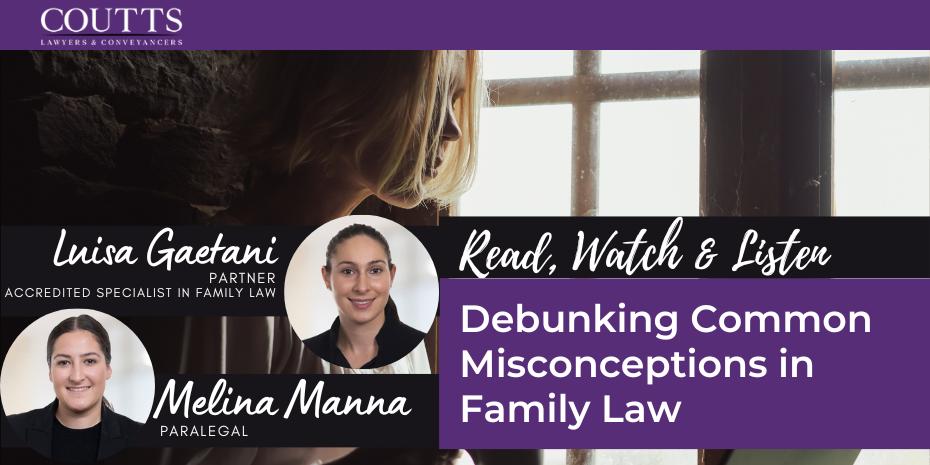Co-authored by Isabel Strahan
KEY TAKE-OUTS
- State Revenue and Fines Legislation Amendment (Miscellaneous) Act 2022 was assented on the 19th of May 2022 and is now in effect.
- This Act makes changes to the Duties Act and alters the circumstances where stamp duty exemptions can be applied in relation to the irrevocable breakdown of a relationship.
- Despite Consent Orders and Binding Financial Agreements no longer being required for stamp duty exceptions, they are still useful in providing evidence for the division of property and the final severing of financial relationships.
Family Breakdowns: Who is exempt from paying stamp duty in NSW?
The State Revenue and Fines Legislation Amendment (Miscellaneous) Act 2022 has amended the Duties Act 1997 to allow for duty exemptions to be granted where the Chief Commissioner is satisfied that an agreement was made for the purpose of dividing property in the breakdown of a relationship. Previously, duty exemptions were only awarded if the former couple were parties to a formal agreement in relation to the division of assets in either Consent Orders or a Binding Financial Agreement following their split.
However, despite this change, Consent Orders are still valuable in ensuring that the division of the property pool is fair, legal, and final.
What are Consent Orders in Australia?
A Consent Order is a formal agreement that is approved by the Court. For the Consent Orders to be finalised, the Court must be satisfied that the agreement is ‘just and equitable’ and in the ‘best interest’ of any children involved. These Orders are enforceable by the Court, and usually empower the Court to act on behalf of a party who refuses or fails to do so.
Why are consent orders still important?
During the breakdown of a relationship, couples often make informal arrangements regarding the division of property. Whilst this is beneficial, unless the arrangement is formalised and documented, it cannot be enforced by the Court. Therefore, without documentation of the agreement, it cannot be relied upon by either of the parties.
When Consent Orders are approved, they serve as formal documentation of the agreement and the Court then has the power to enforce them. Consent Orders also sever the financial relationship between the parties which allows for the parties to move on from the relationship without having to worry about the other side making a claim several years down the track. Bypassing this step could result in proceedings being brought to the Court many years later once the financial circumstances of the parties has changed – for example if one party received an inheritance or windfall such as compensation claim or even winning the lottery. Conversely where one party amasses significant liabilities the other party could potentially be jointly liable for those debts unless the financial relationship is severed.
Do I need a lawyer?
The breakdown of a relationship is highly emotional and often, emotions can lead to clouded judgement when discussing the fair and equitable division of property. Seeking legal advice allows for some stress to be eased in this process, as the former couple will communicate through their instructed solicitors, rather than directly with each other. This is useful in avoiding lengthy negotiations and arguments stemming from the irrevocable breakdown of a relationship.
Not only does seeking legal advice provide a barrier with communication and ensures that professionalism is maintained, but it also makes sure that the outcome reached is considered ‘just and equitable’ by the Court. If the Court is unsatisfied that the agreement reaches this standard, it will be requisitioned and unable to be finalised. This ensures that the outcome is fair for all parties involved. It also aims to ensure that a difference in negotiating power does not result in a skewed outcome.
Throughout the process of drafting Consent Orders, the lawyer will consider each party’s financial and non-financial contributions to the relationship when calculating the division of property. This is a complex process which requires legal knowledge regarding precedent and the interpretation of legislation. An experienced lawyer will consider past contributions as well as present and future needs to ultimately draft an agreement that is the best outcome for you.
Consent Orders can also be used to enforce a superannuation split and ensure that any compensation, inheritance, or redundancy payment that are made following the split, cannot be claimed.
What is the difference between Consent Orders and a Binding Financial Agreement?
A Binding Financial Agreement is a private contract entered into by both parties that will formalise a couple’s property, assets and liabilities which will be divided in the event of a breakdown of marriage or de facto relationship. Couples can enter into a Binding Financial Agreement before getting married, while married, during a separation or after the separation.
Binding Financial Agreements do not need to be approved by the Court.
Each party must receive independent legal advice for the agreement to be binding.
Summary: stamp duty exemption and importance of consent orders
Whilst Consent Orders are no longer required for former couples to receive an exemption of duty, they still prove to be beneficial in providing the Court with a finalised, documented, and fair agreement regarding the division of property.
If you have any questions regarding the process of drafting and filing Consent Orders, or your options regarding property settlement, feel free to book in an initial consultation with someone from our Family Law team. As experienced professionals, they will be able to guide you through this complex process and try to achieve the best outcome for you.
ABOUT ISABEL STRAHAN:

Isabel joined the Coutts team in January 2022, as a Paralegal working within our Family & Criminal teams. She is currently studying a Bachelor of Laws and Bachelor of Arts, Majoring in International Relations and Minoring in Cultural Studies at the University of Wollongong. It is her dedication and hardworking nature that will see her go far within Coutts.
For further information please don’t hesitate to contact:
Isabel Strahan
Paralegal
info@couttslegal.com.au
1300 268 887
Contact Coutts today.
This blog is merely general and non-specific information on the subject matter and is not and should not be considered or relied on as legal advice. Coutts is not responsible for any cost, expense, loss or liability whatsoever to this blog, including all or any reliance on this blog or use or application of this blog by you.



